#blanche Ingram
Text

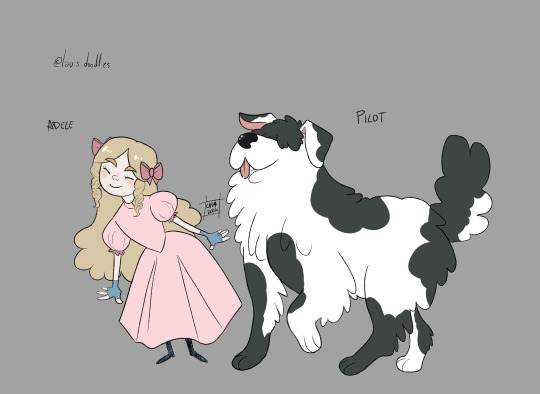
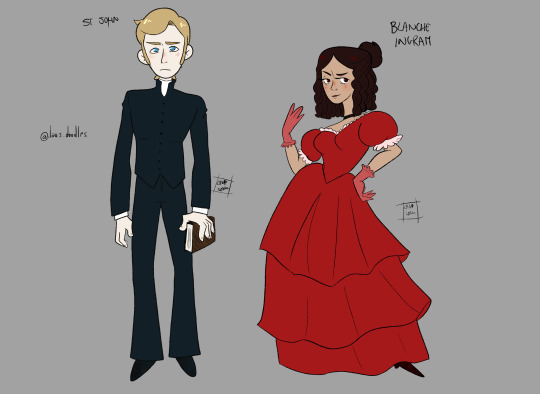
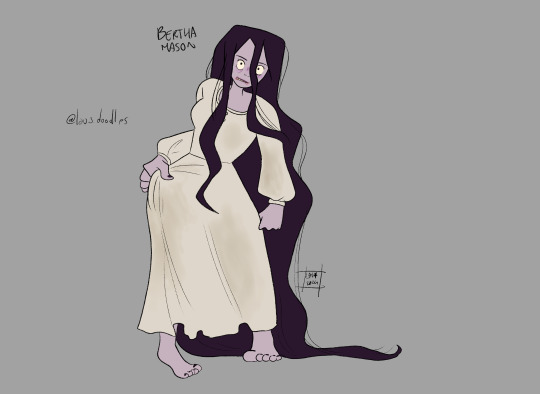
Jane Eyre characterss
My friends gifted me this book for my birthay and i loved it!! So here some character design like i did before for Wuthering Heights eheh
#jane eyre#jane eyre book#jane eyre fanart#character design#classical literature#bronte sister#charlotte bronte#edward rochester#bertha mason#st.john#blanche ingram#art#artist#jane x rochester#gothic books
31 notes
·
View notes
Text
More Jane Eyre analysis, this time concerning the Varens family backstory and my theories and opinions on the characters of Adèle and Rochester, as well as their depictions in the 1996 and 2006 adaptations--
In a post I made, I mentioned that Céline Varens (mother of Adèle Varens) was dead, and someone (@thoumpingground, thank you!) replied with how they thought Céline had just ran away with a musician and never actually been pronounced dead. This led me to wonder, because a lot of the criticism and essays I've read repeat the idea that Adèle is an orphan and/or that her mother died, and I myself could have sworn her mother died of consumption or typhus. But no! I went on the Internet Archive and re-read passages about Rochester and the Varens, did a deep reading, and came to other conclusions which totally changed my understanding of these characters. Below I try to untangle and assess this apparently common confusion.
Here are the details I've gathered: 1) Adèle tells Jane only that her mother died, 2) Rochester tells Jane only that Adèle's mother abandoned her. I originally believed that she died after the abandonment, but it seems more likely that 3) Rochester must have told Adèle that her mother died because it was easier than explaining the abandonment. 4) Neither Rochester nor Jane believe that Adèle is his biological child, and no biological father ever claimed her, making Adèle paternally as well as maternally abandoned. 5) After Rochester tells her the story of Adèle, Jane calls Adèle an orphan like herself, not because she believes Adèle's parents are dead, but because she's likening abandonment to orphaning.
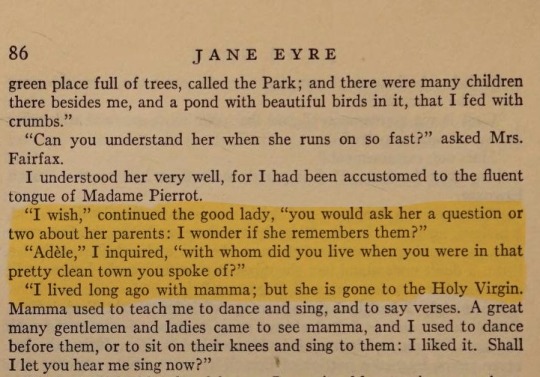
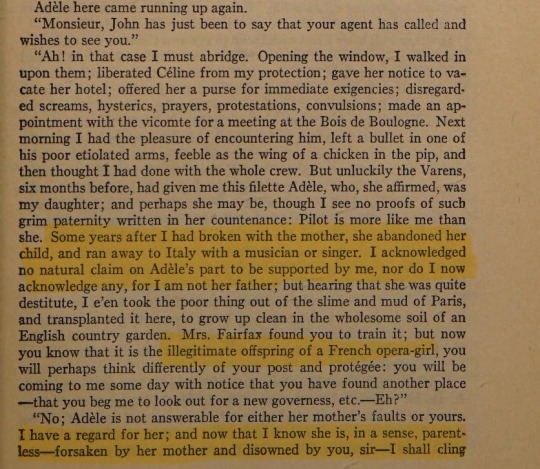
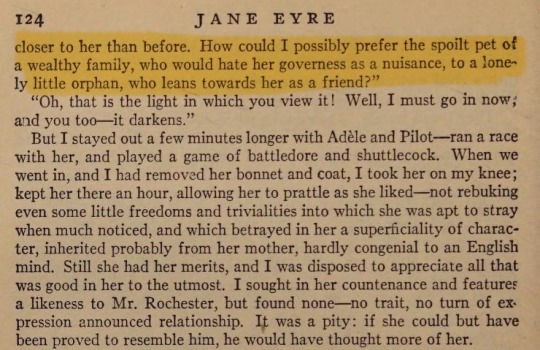
I believe that Rochester's probable lie to Adèle is fully in line with his character because the entire plot of the novel largely hinges on his repetitive deceptiveness. His love for toying with the truth, combined with his flair for the dramatic and his passionate feelings of betrayal at the hands of Céline, render it easy to believe that he would've seen Céline's abandonment and infidelity as her being metaphorically "dead" to him. As Rochester often conflates feelings and facts, and continuously blurs the lines between fiction and reality (every other line he's mentioning elves and mermaids), he wouldn't have seen him calling Céline dead as being a complete lie, and this is what makes it more believable to me.
Rochester usually believes his own lies to some extent or is able to justify them. His talent at deception a major attribute (and flaw) of his, as well as something we readers are constantly left to debate the morality of; this is made more complex by most of his lies being understandable or sympathizable, even if sometimes ridiculous. This is what makes him an appealing character.
He imitates a fortune teller on the basis of fortune telling being inherently deceptive anyway (as Jane states). He dons this disguise to break-up with Blanche while uncovering her true motives and protecting her feelings in the process, as well as to try to covertly assess the truth of Jane's feelings and to reveal his own.
He claims to be a bachelor and tries to get remarried because he felt like Bertha had already been metaphorically and spiritually divorced from him a long time ago, if not in actuality. He deceptively hides in Céline's room in order to ascertain what he already knows to be the truth and to convenienly confront her. Céline's larger deception allows him to feel that his own one is justifiable. He also deceives Jane when they first meet by failing to inform her of his identity, but he doesn't assume a false identity, either, complicating this lie as well.
He leads everyone (but most importantly, Jane) to believe he's planning to marry Blanche even after we can tell that he's really planning to marry Jane. This again is a sort of half-lie in his eyes, because he truly did plan on getting remarried to someone.
I also have a theory that Rochester really did plan on marrying Blanche before deciding to propose to Jane, considering that: 1) we're told by Mrs. Fairfax that Rochester and Blanche had flirted before Jane was in the picture; 2) Rochester says that Blanche resembles Bertha, who he said he married because he was attracted to her; 3) it wouldn't make sense that Rochester would go through so much trouble to lead Blanche on solely to make Jane jealous, especially not when we know he had set his sights on Blanche before he knew Jane and prizes constancy in affection above all else; 4) Blanche's character specifically matches that of all his other past lovers (in short, more beautiful on the outside than the inside) which supports the idea that his attraction to her and intention to marry her was actually genuine at first.
In short, all Rochester's lies are omissions or half-truths, always justifiable in his eyes because they're performed to protect himself, or others, or as a method of assessing the truth. He follows an odd set of rules regarding deception, and this is in line with the strong fae/folklore/trickster themes of the novel which many academics have noted. I don't believe he ever deceives carelessly, on a whim, or in order to be purely cruel.
Adèle informs Jane that her mother has gone to heaven, so evidently she has been told so by someone. I also believe his probable lie to Adèle is important because it is more proof that he truly does care about her beneath his reluctance to love her due to her similarity to her mother.
I can imagine Rochester sitting her on his knee and explaining this to her much like he later explains to her in the carrage of his and Jane's elvish, honey-"moon" adventure tale. Despite openly criticizing her and her mother, Rochester still doesn't want Adèle to have abandonment issues, to feel lonely, or to break her heart by ruining the good memories of her mother which she so clearly covets, as seen by her proud presentations of the song, poetry, and dance she says her mother taught her.
I don't know why adaptations haven't banked on these points, since Rochester's relationship with Adèle is one of his most redeeming qualities, even despite his occasional coldness to her. The 1996 version is great because out of all the adaptations I've seen or read about (not all of them because there are a million), it has the most emphasis on Adèle and her relationships.
1996 also keeps the line about her mother going to the Holy Virgin, and we get the impression that she was raised by her mother, whereas in the 2006 BBC adaptation for example, we're shown that Adèle was left to Rochester in her crib, yet Rochester still says Adèle inherited her mother's bad "French" attributes, which from his perspective must be genetic.
All the Rochester's question Adèle's nature v nurture attributes to some extent, but choosing to give Adèle no memories of her mother as the 2006 does kind of changes the Adèle/Céline discourse to being more genetic in basis. In other words, the 2006 focus is more on questioning nature rather than nurture, whereas other versions focus on both, or focus on nurture.
All the Rochester's speculations on Adèle's genetics keeps in line with 19-century anti-French British sentiment, and the increasing Victorian "nature vs nurture" discourse. For 2006 Rochester specifically, this all fits with his interest in biology & nature -- his specimen collection, him helping with Adèle's lessons, his scientist friend, the twin/twin flame theories; all 2006 inventions which clearly have a lot of historical and textual basis. However, in all the versions, it seems Adèle's vanity and "French defects" (as Jane dubs them in the book) whether genetically or socially imbued, exist to emphasize how nurture is just as important as nature.
Bertha Mason and John Reed exist as examples of ill nature overpowering weak nurturing, whereas Jane Eyre and Adèle Varens are examples of undecided nature strengthening in resolve after an upgrade of nurturing. For Jane this was through Bessie, Miss Temple, Helen Burns, and Mrs. Fairfax. For Adèle it was Mrs. Fairfax, Jane, and then Jane sending her to a good school which she says at the end of the book was responsible for turning Adèle into a great person.
But there is also an emphasis on the willpower of Jane and Adèle, as there is for Edward Rochester, who we learn from his account probably had poor nurturing, as he says his father and brother tricked him into marrying Bertha. As an aside: the 1996 version really emphasizes the implication that Rochester's dad and brother sucked, which I agree with, but I think it's also part of the problem of this film making Rochester a little too sympathetic (lol).
It makes sense that in the book Adèle had apparently been old enough to actually remember being socialized by her mother and therefore had been more capable of absorbing her mother's character. Perhaps 2006's approach is more intelligent, as it leaves the theory of nature v nurture more up for debate just like Adèle's parentage is (though Jane and Rochester are decided against his paternity, we have no way of ascertaining it).
I wish we had been able to see or hear more about Céline interacting with Adèle, as it would have explained how Adèle came to love the performing arts and to worship fashionable ladies. In the book, this is essentially her clinging to memories of her mother, which are later replaced by Jane's influence.
Adèle's status as an orphan (if not a literal one, a metaphorical one) is worthy of analysis because it also links her to the (literally) orphaned Jane and Rochester. Their mutual orphanage leads them to bond and form into a found family. Jane blatantly declares this kindredness to Rochester as highlighted above, and I believe Rochester must also feel this connection as shown by his devotion to Adèle, as he explains he took her on because she had no one else in the world (except Sophie maybe, but she couldn't support Adèle alone).
#my analysis#jane eyre#adele varens#charlotte brontë#the bronte sisters#celine varens#mr rochester#literature#english literature#analysis#literary analysis#blanche ingram#opinions#theories
63 notes
·
View notes
Text

redraw of that one photograph of a ballerina from the 1910s, but turning her into Blanche Ingram
#my art#dress history#fashion history#historical fashion#historical fanart#jane eyre#charlotte bronte#bronte sisters#blanche ingram#painting#acrylic#acrylpainting#1840s fashion#1840s#1800s#1830s#1830s dress#1830s fashion#19th century#pinterest#redraw#historical redraws
18 notes
·
View notes
Photo
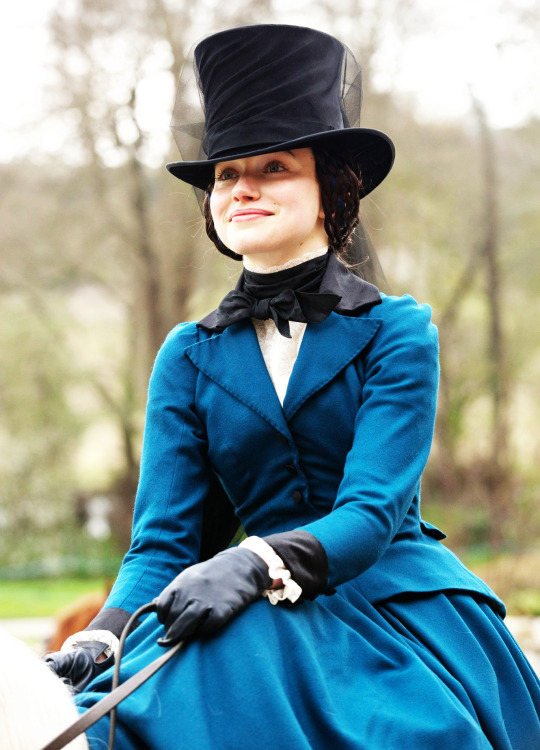
Imogen Poots as Blanche Ingram in ‘Jane Eyre’ (Film, 2011).
#imogen poots#blanche ingram#Jane Eyre#perioddramaedit#fashion#brown hair#blue eyes#19th Century#Michael O'Connor
87 notes
·
View notes
Text
Blanche Ingram opining on gender (in Jane Eyre ch. 17) —
“‘Oh, I am so sick of the young men of the present day!’ exclaimed she, rattling away at the …[piano]. ‘Poor, puny things, not fit to stir a step beyond papa’s park gates: nor to go even so far without mama’s permission and guardianship! Creatures so absorbed in care about their pretty faces, and their white hands, and their small feet; as if a man had anything to do with beauty! As if loveliness were not the special prerogative of woman—her legitimate appanage and heritage!
‘I grant an ugly woman is a blot on the fair face of creation; but as to the gentlemen, let them be solicitous to possess only strength and valour: let their motto be:—Hunt, shoot, and fight: the rest is not worth a fillip.’”
(Paragraph breaks mine)
#jane eyre#emily bronte#Blanche Ingram#gender in England in 1847#loveliness is the special prerogative of women
2 notes
·
View notes
Text
When will people understand that I, Blanche Ingram, am not in fact blonde?!
#blanche Ingram#jane eyre#jane eyre 1943#jane eyre 1996#jane eyre 1997#the blonde mean girl is overdone anyways
5 notes
·
View notes
Text
Blanche Ingram
Little developed side characters offer endless possibilities.

Blanche's refusal of Rochester, if it indeed happened, could have been a Persuasion situation. It's not one I prefer personally, I like my Blanche not giving a fuck about Rochester. In fact, I headcanon her as lesbian. One of the scenarios I like to imagine is that she wanted to marry old Roch because she knew of his womanising ways and it didn't matter to her, for she'd be able to have a girlfriend too. (I'll get to the womanising.)
In the grand scheme of things, Blanche doesn't matter at all--she has no bearing on the plot. Nothing would change if she wasn't there, or if her part was reduced. It can be argued that her purpose in the narrative is to provide romantic tension. But why? The story already has plenty of conflict. If the author's intention is to showcase the contrast between a plain governess and an upper class lady like Blanche, then Blanche merely needs to exist as a guest at Thornfield, without having to be a rival love interest for Rochester. That part in the book, the morning after the fire in Rochester's bedroom, when Jane is impatiently waiting to see him, to talk to him, and gets told he travelled to Leas, where people of his class have gathered for a party, and she hears he is popular with the ladies? That's actually brilliant. The realisation of her poor, insignificant governess-y self? The grasping of her foolishness for thinking she could matter to him? It's so... raw. No doubt many of us have experienced something similar. Then Mrs Fairfax tells her of Miss Blanche Ingram, beautiful and accomplished, how she reigned like a queen at a Christmas party at Thornfield seven years ago. You know you have no chance against that. It's powerful, it hits the reader in the feels. Even if the reader doesn't like Rochester. Jane does. This bit alone provides enough romantic suspense for the whole book. The merry company didn't even need to arrive at Thornfield, really, though I'm glad they did. There's so much fun to have with these characters.

What I'm arguing is, Charlotte didn't have to go as far as having the Roch pretend he was going to marry Blanche, even if she needed Blanche to provide romantic tension. A purely friendly banter between Blanche and Edward, filled with references to their past encounters and inside jokes would have sufficed. "Remember that time we were staying at Gosford Park, and we thought the place was haunted by the ghosts, but it was only Countess of Trentham's snoring?" Followed by laughter. You catch my drift. Not only is Blanche beautiful and classy, she has a history with Edward.
Digression - A Better Man
It still wouldn't paint old Roch in a favourable light, mind you. He still left for Leas without a word, the morning after Jane saved his literal ass. He could have left her a note. Dear Jane, I am called to Leas for a gathering of old friends. I will be back in a fortnight. I will miss our evening conversations. Yours, E F Rochester. But that would not be Edward Rochester, because that would be an entirely different man, a better man, a man who would not house an arsonist under his roof, and that would mean any fire in his bedroom would be only accidental (more on that later). This man would not force a governess to sit in the drawing room with high society--or he would have introduced her as part of a family, demanding they treat her as an equal. This man would not unnerve her so much she'd run out of the drawing room, he would not make her cry, he would not leave her abruptly in the hallway with a sentence unfinished at "goodnight, my", he would not feign attraction to a different woman, a woman Jane cannot compare herself to and win. This man would not lie that he got her a new job across the Irish Sea, forcing her to expose her feelings for him. It would be an entirely different story.
Of course, he as the master of the estate owed her, his employee, no explanation for why he went to Leas. But in that case he should not have allowed them to become so close that she practically looks on him as a friend. And after such a distressing event as a fire in a bedroom--and her saving his life--a note of courtesy would be just good manners. Dear Miss Eyre, thank you for saving me from becoming a well done steak last night. I will be gone for two or three weeks. Keep up the good work with Adele. Sincerely, Rochester.
End Digression - Back to Blanche
I take Jane's descriptions of Blanche with a pinch of salt. When Jane went to Rochester to ask for a leave of absence, he was playing billiards with the younger members of the merry company. Jane describes that Blanche gave her a look demanding to know “what can the creeping creature want now?” But that is only Jane's imagination, Blanche never said anything like that. (Curious that Jane thinks someone finds her creepy. Maybe she stares at people.) All Blanche said was:
“Does that person want you?”
"That person" is cold, but it's not like Blanche is obliged to remember the name of some governess. (Also Rochester didn't see Jane, so had Blanche not alerted him to her presence, Jane would have continued standing there like an idiot.) During the gypsy fortune teller episode, when Jane was fetching wine from the drawing room for Rochester in the library, she tells us Blanche looked at her suspiciously, no doubt thinking Jane was taking liberties. Again, it's just Jane's imagination. We don't know what Blanche was thinking. Even if Jane was right in her impression, well, Blanche could have thought that and so would many people. As far as Blanche was concerned, the person Jane was talking to in the library was the gypsy fortune teller. Of course it would seem weird to Blanche that Jane was getting her wine! If Blanche guessed the gypsy woman was Rochester in disguise--and I like to think she did, and so did the other girls, or at least one of the Eshtons--it was still strange that Jane fetched him wine. Why couldn't he get it himself? Was it so important to him to keep his gypsy play act? But he asked Jane to tell Mr Mason to come to the library to see him--so it means he already dropped the act for everyone else, not just Jane.
Another thing to consider is that Blanche may have wondered whether something was up at Thornfield. She may have wondered why the governess was always sitting with them in the drawing room, when she wasn't part of the company. (She probably wasn't the only one in that.) She may have wondered about Adele, too, was she Edward's child or not? She may have wondered about the newcomer, Mr Mason, how come she had never heard Edward mention him in the seven years she'd known him?
And another point. That moment when Rochester ambushed Jane in the hall, when she was running away from the drawing room with tears in her eyes after hearing him sing, he was afraid a servant would see them. Was it an Ingrams' servant he worried about? (The merry company brought their own servants with them.) If he was performing an act of potential future husband for Blanche, of course he couldn't risk her discovering how close he got to a governess. I like to think of Blanche's lady's-maid as one who spies for her mistress.
Blanche is the detective of this mystery.

In any case, Blanche is the character with the biggest potential for development. Have her care about something and ta-dah--character development. As I said, I headcanon her as a lesbian ("women are beautiful"), so that already gives me a different angle to her altogether. Whatever Charlotte Bronte intended with her character, Blanche enables me to see Rochester's true awfulness.
5 notes
·
View notes
Text
I've been dreading Chapter 42, not bc it's bad--on the contrary!--but bc I knew I would have an unpopular opinion. So *deep breaths* here it is:
I don't like how LMM dealt with the Ethel Traverse situation. I don't like that the reason for the break up was that Ethel was only after his money. It's cheap and lazy!
What I would have preferred instead is Ethel dumping him for a different guy, or Barney dumping her after she laughed at that sketch in the paper, dismissing his feelings, telling him to "get over it, it's just a sketch". Basically, I hate when any fiction does that "woman evil bc she wants to marry rich" thing. It's tired and overdone. And also misogynistic. I mARry hIM bc I LUUURVE Him nOt FoR hIs mOnEy, shut up, no woman is obliged to marry a broke loser. Men marry women for money and don't apologise for that.
College-era Barney was not the Barney we know and love. What made him be what he is now is leaving home and living in the wilderness. He didn't like who he was, so he went away and worked on himself, instead of turning into a bitter incel. We always need stories like that. Ethel could have just married someone else and lived happily ever after.
It seems to me that LMM simply chose the laziest way out here. Maybe she just needed to finish the novel asap, she was writing this and Emily's Quest at the same time. I don't know. It's also not like her. In the Anne series, Jane Andrews expresses her wish to be rich--and she marries a rich man and is happy. The "I don't want sunbursts and marblehalls" from Anne x Gilbert proposal doesn't mean that Gilbert will be forever poor--he's studying to be a doctor. LMM knew the importance of money; her publisher was ripping her off and she was the main breadwinner in her marriage, yet it was her husband's profession that determined where they'd live.
So that's just my thoughts.
#blue castle book club#the blue castle#l.m. montgomery#lmmblogging#unpopular opinion#no such thing as gold digger#i don't use that word. unless i'm quoting#also resident blanche ingram fan here#mypost
31 notes
·
View notes
Text
i also do think that in jane eyre charlotte bronte intends for jane and bertha AND ROCHESTER to all be sympathetic in their own ways. the only truly outright malicious/evil characters imo are mrs. reed, mr. brocklehurst, and the late mr. rochester senior.
#there are of course bitchy characters like blanche ingram (and st. john rivers) but i wouldn't say they're like truly BAD people#obviously there are MAJOR issues with how bertha is treated by the narrative (especially wrt race and racism)#but i do think we're not supposed to hate her or think of her as like inherently ''inferior''#like idk.....i feel like a lot of what charlotte bronte dislikes and is clearly against in this book is hypocrisy#like jane is always calling people out on hypocrisy (including rochester)#and the most villainous characters are the biggest hypocrites of all#i think that's the true ''evil'' in the book#jane eyre#text
112 notes
·
View notes
Text
what an adventure that was. roger scores a 3/10 on boyfriendism this time. not his worst but much room for improvement.
#the stars are mostly for the fact that it was so canonical.#TERRIBLE. rochester-coded man spends the entire time with redheaded 1960s blanche ingram.#and the one day he actually goes to work is the day people try to drown his girlfriend on his boat.#WHY. HE COULD HAVE BEEN HEROIC! BOO!#ds liveblogging.
2 notes
·
View notes
Text
can someone please tell me why I am sketching out a Dreamling-Jane Eyre AU that I will never, ever write?
#I mean...... Byronic goth antihero Dream as Rochester#lively clever interested-in-life Hob as Jane#The Corinthian as the mad mistake in the attic obvs#the PINING the PASSION#I don't think you could do the whole book bc parts of the story just don't map well#(like it doesn't feel fair to anyone to cast them as Blanche Ingram except MAYBE Johanna but I like her too much to do that to her)#like I said I will never get around to actually doing this but I like it#Dreamling#The Sandman#Jane Eyre#sorry not sorry#my writing
9 notes
·
View notes
Text
jane eyre 2006 fans: in ep 3 toward the beginning, what is your interpretation of the scene with rochester and blanche ingram where she talks about renovating the furniture and he intently asks her "what do you rly want, blanche?"
having rewatched the series more than once, it feels more and more awkward/out of place as an addition - like there were probably deleted scenes or something that got cut out. it just doesnt seem purposeful at all. because before that, we see rochester admitting to having the fortune teller upset blanche - and after that, we see him part ways with the ingrams, giving her mother a death stare. so what did blanche tell him!!!! because i highly doubt she confessed to being a gold digger, and upon further analysis, she just seems annoyed in most of their scenes together and doesn't even seem to be into him at all. it's her mother doing everything.
and upon further consideration i honestly get the vibe that maybe she told him she didnt want to get married at all lol and that may be why rochesters attitude seems more directed at the obnoxious mrs ingram. anyway, blanche's prolonged silence and coyness in that scene is increasingly perplexing to me although i thought nothing of it upon first watch. maybe I'm just overthinking. idk what the director was going for there.
i also notice that aside from two or three snide comments, she really is a normal lady with a horrible mother lol - when everyone freaks out over mason's screaming, she takes initiative in asking what the hell is going on. she's the best female rider in the county supposedly. she shows courage at the ouija game. i don't really buy that 2006 blanche was really that devious or in love with rochester, but just a lady being practical & trying to please her mom. anyway!
#jane erye#jane eyre 2006#blanche ingram#any blanche stans wanna chime in#blanche is a lesbian truthers where are you#from various posts/essays/fanfiction i've read i know at least 3 of u exist#mr rochester#analysis
12 notes
·
View notes
Text
feeling very jane eyre chapter 16
#that a greater fool than me had never breathed the breath of life etc etc#your folly sickens me!!!!#she said something in praise of your eyes did she? blind puppy! open their bleared lids and look on your own accursed senselessness!#jane is so funny. and so real </3#i should learn from her and daydream about opening schools and forget blanche ingram (a random dude) has better chances than i do#(it’s not even a big deal. praying i forget about this in a month or something 🙏🏻)#anna.txt
1 note
·
View note
Text
Edward Fairfax Rochester and Jane Eyre, both ridiculously in love with the other:
Mr. Rochester: "Blanche Ingram? Oh yeah, she's the hot stuff, definitely wife material, sexiest thing I ever beheld, don't you also think we'd literally be couple goals? Anyway, I'm 100% going to ask her to marry me"
Jane Eyre: "Yeah, so, I met this cousin of mine who looks like a Greek god. Sir, I cannot stress how physically perfect he is. Also, he is a minister, so he's obviously the best man who ever lived and a paragon of exemplary behavior. He asked me to marry him, btw, if you even care"

#Jane Eyre#charlotte bronte#edward rochester#i simply adore them#anyone who says jane is the adult one in this relationship is delusional#theyre both equally fucked up and i want to vore them
328 notes
·
View notes
Text
Jane Austen was so insane for writing Emma I’m losing my mind
Like you have the mean bossy femme lesbian in her late 20’s, living off her trust fund and becoming hyper-obsessed with a local pretty peasant girl Jennifer’s Body style. People call her perfect, and she knows they’re right
(They’re wrong. Her childhood best friend - her metaphoric conscious - reminds her every day.)
She’s the protagonist of this book but the antagonist of every other: she’s Caroline Bingley, Blanche Ingram, Cordelia Chase, Regina George, Heather Chandler. She’s the queen of this school, and popularity is a hell of a drug.
(Popularity is the only power she has. There’s something itching at the back of her brain: She doesn’t want to be this. She doesn’t want to do this. Why is she trying to impress all these mean people.)
She can do no wrong. She mocks the annoying weird girl and everybody laughs and the weird girl finally shuts up.
(He’s frowning at her in the background. She’s frowning at herself. She’s angry at both of them)
People think she’s charming and beautiful and so kind.
(They’re wrong.)
She keeps everybody at arm’s length, staying mean and fiercely independent.
(They can’t see her loneliness. Her failures. The way she watches her pretty new friend laughing joyfully and beautifully in the sun, and it just makes her feel sad.)
She plays Cupid because she sees people as her play things - love is just a game for her.
(She plays Cupid because she knows that everybody will leave her in the end, anyways. This just allows her to control it.)
Jane Austen famously called Emma “a heroine whom no one but myself will much like.”
(I like her too)
#emma#Jane Austen#I’M VERY NORMAL ABOUT EMMA#ultimate beloved queer coded mean girl#jane austen said ‘i want to take this mean girl and study her for science’ and that’s such a mood#uh this post got out of hand. i might just be gay for emma.#also yes Emma is actually 21 this is a vibes ONLY post
308 notes
·
View notes
Text
Thoughts on my first viewing of Jane Eyre 2006
(I have a vague notion that I've watched this before, but if so, I'd forgotten most of it.)
Overall: Really enjoyed it! Both Ruth Wilson and Toby Stephens did a great job, it packed an emotional punch, and I thought the screenplay did a decent job at condensing the novel into its nearly 4-hour running time.
Now for some more detailed random thoughts:
WTF is a "half-cousin," St John?? (I guess they did this to make it less weird for him to want to marry his cousin? But it just makes it more weird to me, because that's not A Thing.)
Even though my husband was like "Why does Jane even like him?", I thought Rochester was a bit too nice. I especially wanted more of him being super cranky when Jane is not letting him buy her fancy stuff or refusing to eat dinner with him, because he deserves to be driven crazy by this after the Blanche Ingram stunt. He also wasn't quite weird enough. But, I did like his passion, strength, and charm, and he had great chemistry with Jane.
Ruth Wilson portrayed Jane's passionate spirit trapped under a calm and proper exterior really well.
The proposal scene was great! The drah-mah! The romance! The laughing in the rain afterwards!
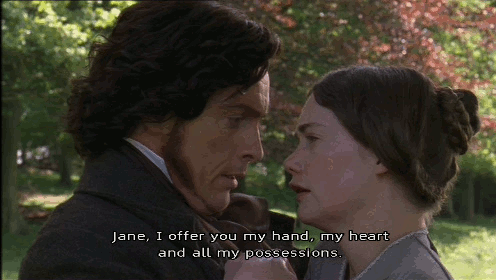
This is controversial, but I loved the sexy stuff when Rochester is trying to convince Jane to stay, because it definitely is a sexual temptation for her that she has to overcome, and the sexual tension between them is so palpable in the book. They translated this well to screen, IMO.
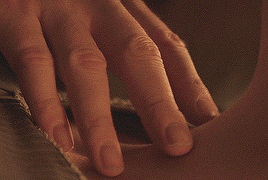
I missed the religious themes from the book. It's an integral part of Jane's choice and Rochester's redemption, and God is an actual entity that drives the plot in the book. You don't have to believe in religion in real life to appreciate it within the universe of a piece of media.
I also missed St John's famous line "You were built for labour, not love." Why cut that? It's such a great line! And by "great," I mean it makes me want to punch St John in the face or throw up.
As usual, Jane and Rochester are too attractive. Especially Rochester. I mean geez, Toby Stephens?!
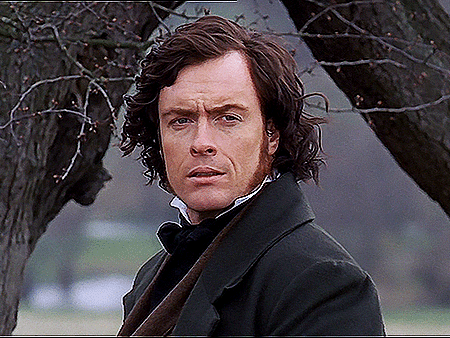

No, we don't have a potion for that, sir, because you're already extremely handsome! 🙄
#jane eyre 2006#jane eyre#mr rochester#toby stephens#ruth wilson#gifs#film analysis#i watched this months ago and forgot to post it
56 notes
·
View notes